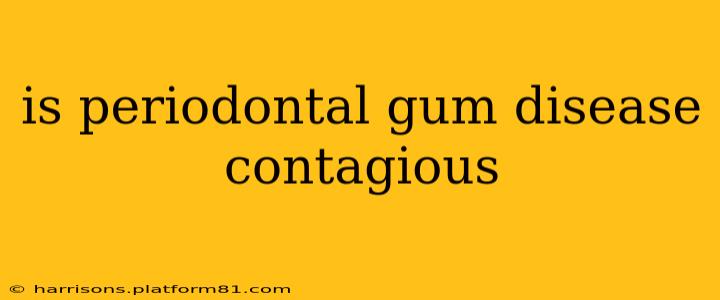Periodontal disease, also known as gum disease, is a common infection affecting the gums and supporting structures of the teeth. While not directly contagious in the same way as, say, a cold, there's a growing understanding of the role of bacteria and its transmission in the development of periodontal disease. Let's delve into the nuances of this question.
Can Periodontal Disease Be Passed From Person to Person?
The short answer is: no, periodontal disease itself isn't directly contagious. You can't catch it like the flu from someone sneezing near you. However, the bacteria that cause periodontal disease can be transferred. This transmission is primarily through saliva, and to a lesser extent, other bodily fluids.
What Bacteria Cause Periodontal Disease?
Periodontal disease is primarily caused by bacterial infections, most notably Porphyromonas gingivalis, Tannerella forsythia, and Treponema denticola. These bacteria form a biofilm, or plaque, on the teeth and gums, leading to inflammation and eventual gum tissue destruction. The specific bacteria present can vary from person to person.
How Can Bacteria Spread?
Several factors contribute to the spread of these bacteria:
- Sharing utensils or cups: Saliva can easily transfer bacteria when sharing eating utensils or drinking glasses with someone who has periodontal disease.
- Kissing: While intimate contact such as kissing can facilitate the transfer of bacteria, it's not a primary mode of transmission.
- Close contact with infants: There's growing evidence suggesting that bacteria associated with gum disease can transfer from caregivers (especially parents) to their infants, potentially increasing the child's risk. This highlights the importance of good oral hygiene in caregivers.
- Poor oral hygiene: While not a transmission route, poor oral hygiene significantly increases the risk of developing periodontal disease by providing the ideal environment for bacteria to thrive.
Does this Mean I Should Avoid Contact With People Who Have Gum Disease?
No, you don't need to avoid contact with individuals who have periodontal disease. However, maintaining good oral hygiene practices is crucial to minimize your risk. This includes regular brushing, flossing, and professional dental cleanings.
What are the Risk Factors for Periodontal Disease?
While bacterial transmission plays a role, various factors significantly influence your susceptibility to periodontal disease:
- Genetics: Genetic predisposition can make some individuals more vulnerable to gum disease than others.
- Smoking: Smoking significantly increases the risk of developing and worsening periodontal disease.
- Diabetes: Poorly controlled diabetes impairs the body's immune response, increasing susceptibility to infections like gum disease.
- Stress: Chronic stress can weaken the immune system, making individuals more prone to infections.
- Medications: Some medications have side effects that can impact oral health, increasing the risk of periodontal disease.
How Can I Prevent Periodontal Disease?
Practicing excellent oral hygiene is the first line of defense against periodontal disease:
- Brush your teeth twice daily: Use fluoride toothpaste and a soft-bristled toothbrush.
- Floss daily: Flossing removes plaque and food particles from between teeth where your toothbrush can't reach.
- Use mouthwash: Antibacterial mouthwash can help control plaque bacteria.
- Regular dental checkups and cleanings: Professional cleanings remove plaque and tartar buildup, which you can't remove at home.
By addressing these factors and maintaining good oral hygiene, you can significantly reduce your risk of developing periodontal disease, regardless of potential bacterial exposure from others. Remember, prevention is always better than cure.
